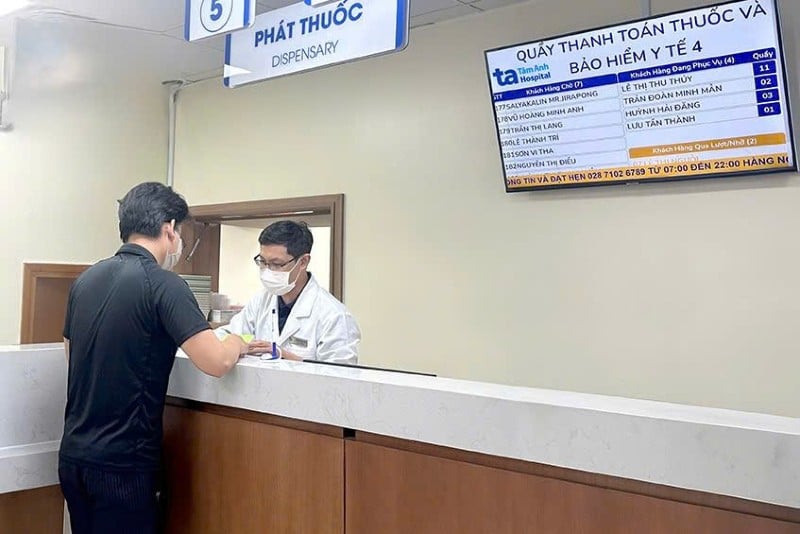This change is the result of a new Circular issued by the Ministry of Health , bringing many benefits to people with chronic diseases.
 |
| Depending on the patient's clinical condition and stability, the doctor will decide to prescribe a 30, 60, or maximum 90-day supply. |
Ms. LHD (75 years old, Ho Chi Minh City) has lived with diabetes for 23 years. In addition, she also has high blood pressure and a herniated disc, which makes it difficult for her to move around. Every time she goes to the doctor, she has to use a wheelchair.
Previously, she had to go to the hospital every month for regular check-ups and to receive medication. However, at her most recent follow-up visit, the doctor diagnosed that her condition was well controlled, so he considered prescribing her medication for a longer period of time.
When she learned that she would receive enough medicine for 2 to 3 months during her next check-ups, Ms. D. could not hide her joy: "If I am given medicine for 2 to 3 months, I will not have to travel as much, significantly reducing travel costs."
Providing long-term medication not only helps Mrs. D. to be less tired, but also helps her relatives not have to take time off work to take her to the doctor, thereby reducing disruption to work and family life.
In addition, Ms. D. is also entitled to health insurance that covers 100% of medical examination and treatment costs because she has participated in the insurance continuously for 5 years.
With a pension of about 5 million VND per month, she said the health insurance support helps her save several hundred thousand VND per month, which is very meaningful for the elderly living on pensions.
Sharing the same joy with Mrs. D., Mr. KQ (70 years old, Tien Giang ) was also very excited to know that his diabetes was on the list of diseases that were given long-term medication.
He said he has been taking medication for 20 years, recently switched to insulin injections so every month he has to go to the hospital for check-ups and to receive medication.
Because he lives alone and has poor eyesight and hearing, he often has to ask his nephew who lives far away to come and help him when he goes to the doctor. Previously, he had asked the doctor to prescribe medicine for a longer period of time so that he would not have to travel frequently, but because of the old regulations, the doctor could not comply.
Even if he wanted to take the medicine for a long time, he would have to buy additional medicines that were not covered by his health insurance. Therefore, when he learned that the new regulation allowed him to receive the medicine for up to 90 days, he felt very relieved.
According to Circular No. 26/2025/TT-BYT issued by the Ministry of Health on June 30, 2025 and effective from July 1, outpatients with chronic diseases will be provided with long-term medication, up to a maximum of 90 days, depending on their health condition and the assessment of the treating physician.
Dr. Lam Van Hoang, Head of the Department of Endocrinology - Diabetes, Tam Anh General Hospital, Ho Chi Minh City, said that based on the clinical condition and stability of the patient, the doctor will decide to prescribe enough medication for 30, 60 or a maximum of 90 days. This helps patients save time, effort and travel costs.
“However, doctors must carefully assess each patient’s condition. For the elderly, the risk of the disease becoming severe is very high, so prescriptions must be based on a comprehensive assessment of health and ability to respond to treatment,” Dr. Hoang emphasized.
He also said that the new health insurance policy is a practical step forward, especially beneficial for the elderly, people with chronic diseases, the poor, the disabled and residents living in remote areas.
This policy helps people access health services more easily without having to face many cumbersome administrative procedures as before.
According to the new Circular, there are 252 chronic diseases that are allowed to be prescribed for a maximum of 90 days. This list includes common diseases such as high blood pressure, diabetes, asthma, chronic obstructive pulmonary disease (COPD), anxiety disorders, depression, etc.
In addition, it also extends to diseases such as chronic viral hepatitis B, HIV/AIDS, hypothyroidism, hypopituitarism, endocrine disorders, blood and immune system diseases such as Thalassemia, hemolytic anemia, amyotrophic lateral sclerosis, Parkinson's, Alzheimer's and dementia.
Expanding the list and time of drug dispensing not only benefits patients but also contributes to reducing the burden on medical facilities and improving the effectiveness of chronic disease management in the community.
Source: https://baodautu.vn/nguoi-benh-tieu-duong-vui-mung-khi-duoc-nhan-thuoc-den-2-3-thang-d335600.html


![[Photo] Da Nang: Hundreds of people join hands to clean up a vital tourist route after storm No. 13](https://vphoto.vietnam.vn/thumb/1200x675/vietnam/resource/IMAGE/2025/11/07/1762491638903_image-3-1353-jpg.webp)










































































































Comment (0)